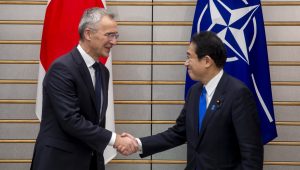As war along NATO’s border approached the one-year mark, Secretary-General Jens Stoltenberg made an official visit to Tokyo. During a joint press conference with Prime Minister Kishida Fumio of Japan, Stoltenberg characterized the meeting as coming at a “critical moment for NATO, and for Japan.”
The growing recognition that the security of NATO members is inseparable from that of its Indo-Pacific partners has brought increased efforts to deepen cooperative ties. From cyber to economic security, opportunities to expand cooperation abound. However, some worry that NATO’s presence in Asia risks escalating tensions in the region. Unsurprisingly, China has cautioned against a “Pacific NATO” and North Korea characterized Stoltenberg’s trip as NATO putting its “military boots in the region.”
Nevertheless, stronger ties between NATO and Japan are mutually beneficial, reinforce Japan’s deterrence-based denial strategy, and should be institutionalized. Institutionalization in this sense means the reification of preexisting ties; it makes relationships more formidable and enhances durability and efficiency.
No stranger to NATO cooperation, Japan’s dialogue and collaboration with the security alliance date back over two decades and have increased in recent months. NATO recognizes Japan as a defensive linchpin in efforts to uphold the rules-based international order. But this is a role Japan has embraced only recently. Under its new National Security Strategy, Tokyo fundamentally altered its defense posture and is moving to increase its defense budget to 2 percent of GDP, matching the expected contribution level of NATO members. Contrary to China’s allegations, the catalyst for Japan’s shift was not nudging from the West or imperial ambition. Rather, it was the actions of Japan’s neighbors – namely, Russia’s invasion of Ukraine, Pyongyang’s missiles, and China’s increased militarization.
From Japan’s perspective, there are good reasons to have NATO at the heart of its deterrence strategy. On the back of its demonstrated commitment to democracy and the rules-based international order, Japan deserves a seat at the table. While admirably stepping up in support for Ukraine, Japan may want to gently remind “the single most consequential alliance in history” of the significant global security threats in East Asia. Tokyo might also consider hedging against the United States’ vacillating posture toward allies as it implements its ambitious new defense strategy. Moreover, the European Union, while crucial to enhancing economic security, is often hamstrung by national legislative bodies and doesn’t include the United Kingdom – with which Japan has plans to build fighter jets – among its members. Only NATO bridges all these gaps at once.
The United States, too, has good reason to lead efforts to strengthen NATO’s ties to Japan. In addition to being a vital economic partner, Japan is perhaps the most crucial element in sustaining a U.S.-led defense of democratic Taiwan.
Grasping constraints and opportunities will be critical to the implementation process. Nuclear sharing is likely a non-starter. Discussions of NATO nuclear-sharing arrangements have become more prevalent in Japan but remain difficult culturally and politically. Japan can instead work on improving dialogue on extended deterrence and focus on areas of opportunity such as maritime defense and cybersecurity. Cooperation beyond traditional methods and borders is necessitated by Japan’s neighbors’ engagement in hybrid and asymmetric warfare. In particular, the pervasiveness and import of cyberattacks flatten the typical regional considerations.
In this context, arguments that NATO’s mission sets some geographical limiting principle for cooperation outside of the Atlantic are less convincing. Interoperability and information sharing in cyber defense is already a priority: Japan participates in the NATO Center of Excellence on cyber security in Tallinn and has trained with NATO allies in cyber defense exercises.
Japan need not be a formal member of NATO to capitalize on opportunities such as participation in official meetings, cybersecurity interoperability, or official channels dedicated to defense science and technology sharing. Nor must NATO’s critics fear some Article 5 type web of commitments that risks escalation. For one thing, Article 9 of the Japanese Constitution aims to prevent Japan from committing to an a priori military obligation. Meanwhile, NATO member Albania set an important precedent after it fell prey to a devastating cyberattack linked to Iran, and received support from NATO without invoking Article 5.
Cybersecurity initiatives can build on the model of NATO’s partnership with Ukraine – another non-member state – in data and information sharing to improve Japan’s cyber defense and resilience. If deterrence fails, Japan will have the advantage of taking such steps before war breaks out.
Those who fear that NATO’s presence in the Asia-Pacific will increase the risk of conflict presuppose that China’s intentions are malleable. Such hopes may have been true at one point in time, but as China’s military buildup and gray zone activities have continued, this view appears increasingly untenable. Still, genuine risks of miscalculation make finding the right balance in Japan-NATO institutionalization all the more crucial.
NATO’s mission during the Cold War was to build a coalition against Soviet dominance. With an equivalent arrangement unlikely to form among Indo-Pacific countries alone, Japan should make the necessary moves to deter its own regional hegemon. By improving interoperability and information sharing with NATO, Japan will take tangible steps that reduce the risk of conflict by making the success of aggressive actions far less probable. These aims are in alignment with both NATO’s strategic concept and Japan’s NSS.
From economic ties to cyber threats, the security of the Euro-Atlantic and Indo-Pacific regions is more interconnected than ever. Recognizing that this “critical moment” for NATO and Japan is key to maintaining peace in the Indo-Pacific means taking steps toward institutionalization sooner rather than later. An institutionalization of NATO-Japan relations that acknowledges constraints and embeds cooperation makes deterrence more credible and peace more probable.

































